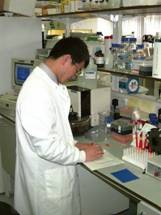|
|
Japanese Scientists Give New Hope to Alzheimer’s
Victims
www.english.people.com.cn
Japan
June 3, 2006

A group of Japanese researchers have discovered that Alzheimer's disease could be prevented by obtaining plasmalogen, which is contained in seafood such as sea squirt, a local newspaper said Saturday.
The researchers from Tohoku University have proved in animal experiments that plasmalogen, which is rich in sea squirt, could prevent the death of nerve cells, the Yomiuri Shimbun newspaper said.
Alzheimer's disease causes severe memory loss and is thought to be caused by the death of nerve cells in the brain. It is also known that the plasmalogen in brains of Alzheimer's patients decreases by near 30 percent, though the exact function of the bio- chemical is yet to be clarified.
The scientists fed plasmalogen to rats with the Alzheimer's and had them search food in a maze. Results showed that the decline of the rats' memory and learning could be prevented, the report said.
The team, led by Prof. Teruo Miyazawa who specializes in food chemistry, discovered that the internal organs of sea squirt contains as much as 0.1 percent of plasmalogen.
Plasmalogen is also found in other seafood such as oyster and sea urchin, but its presence is not as rich. Cow's brains contain plasmalogen, too, though it is risky of bovine spongiform encephalopathy, or mad cow diseases.
The researchers plan to market medicine containing plasmalogen exacted from sea squirts as early as next year, the report said.
|
|



